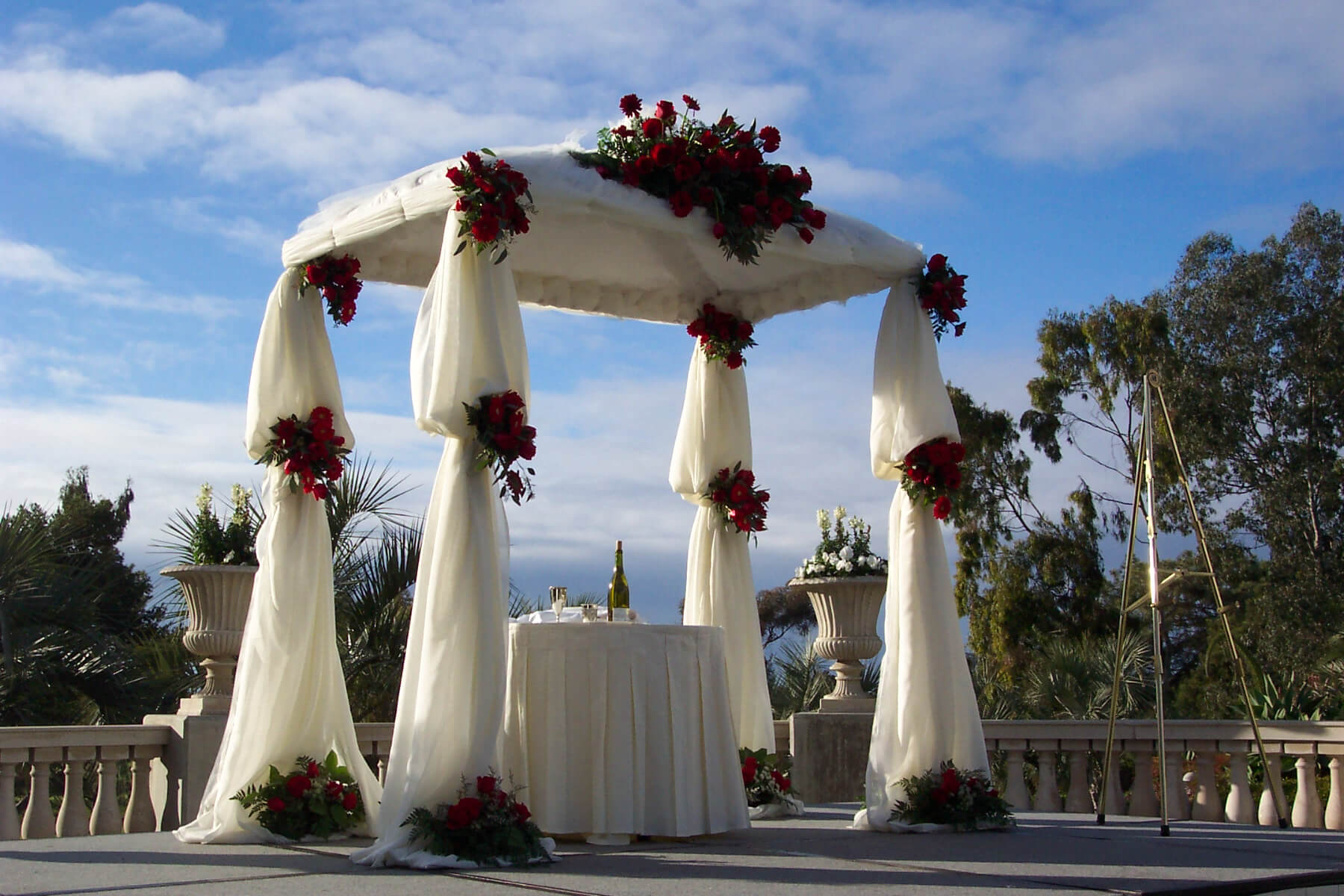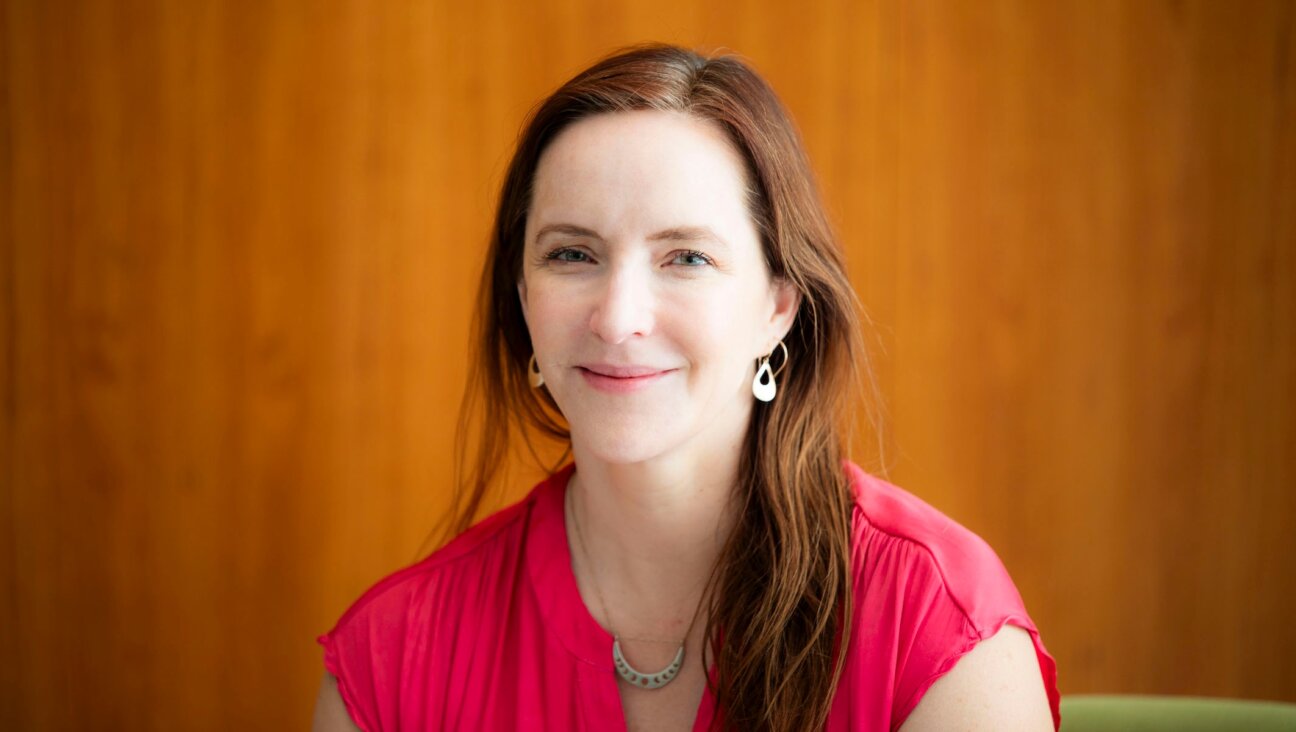Conservative movement maintains its ban on officiating at intermarriages but urges its rabbis to engage more with interfaith families
A new report from the movement recommends cultural and policy changes to “empower Conservative/Masorti rabbis and congregations to more fully embrace interfaith couples”

A chuppah, also known as a Jewish wedding canopy. Photo by Joyride/iStock
(JTA) — The Conservative movement will continue to prohibit its rabbis from performing interfaith weddings, according to a landmark report issued Monday.
But it recommends an array of changes — ranging from new rituals to updated hiring regulations — that aim to make the movement more open to interfaith families.
The 21-page report — the culmination of 18 months of discussion among a working group of 12 rabbis — comes as the vast majority of non-Orthodox Jews are marrying non-Jewish partners. It is being released amid years of debate in the movement over what role, if any, Conservative rabbis should play in the interfaith weddings of their congregants.
The document maintains the ban on officiating, saying that the existing standards “represent a commitment to relationships” among rabbis from across the world who have differing opinions on intermarriage.
It adds that for some rabbis, the intermarriage ban is “connected to their sense of identity as Conservative rabbis” in a world where lines between non-Orthodox denominations may be blurring. Reform and Reconstructionist rabbis are allowed to perform or co-officiate intermarriages. The Orthodox movement prohibits intermarriage.
But the report recognizes that the approximately 1,600 Conservative rabbis should take a more welcoming approach to intermarried couples and their families — and that not being able to perform those weddings makes that more difficult. To that end, the report recommends “other significant changes that will empower Conservative/Masorti rabbis and congregations to more fully embrace interfaith couples through their pastoral approach and through updated policies.”
“I hope that people will see this report as a step forward in the desire of our movement to engage people of other backgrounds who are part of Jewish couples and families,” Rabbi Jacob Blumenthal, CEO of both the United Synagogue of Conservative Judaism and the movement’s Rabbinical Assembly, told the Jewish Telegraphic Agency.
“And that they will see that we are going to work on new approaches in Jewish practice, new approaches within our communities, and new pastoral approaches among our rabbis to be in relationship with and engage members of our communities and their beloved partners,” he added.
Traditional Jewish law, or halacha, prohibits Jews from marrying non-Jews, and the Conservative movement explicitly banned intermarriages half a century ago. But in recent years the rate of intermarriage has increased, and the movement’s standards have changed. In 2017, the movement voted to allow non-Jews to become synagogue members, and the next year, it allowed rabbis to attend interfaith weddings.
Throughout that time, the movement has tried to signal to interfaith couples that they should feel welcome in Conservative synagogues, even if the rabbi couldn’t perform their wedding. In 2020, the USCJ hired Keren McGinity as interfaith specialist. And some synagogues have found creative ways around the ban on officiation: Recently, a Conservative synagogue in Massachusetts hired a cantor who was ordained outside of the movement — and who can perform interfaith weddings outside the synagogue.
The report builds on the idea that Conservative synagogues and their rabbis can embrace interfaith families at every point besides the wedding day. It recommends three specific areas where it says the movement can “[move] away from policies built around rabbinic approval and ‘yes or no’ approaches and towards those built around dialogue and shared responsibility with couples and families.”
The first and most substantive of the three recommendations is to do a fast-track review of “outdated” rabbinic rulings. The movement, according to the report, will reconsider “archaic” rulings that prohibit congregations from congratulating interfaith couples and their families on their engagement, and that bar synagogues from hiring intermarried professionals.
The other two areas are increased pastoral training to welcome interfaith families, and the creation of a “brit,” or covenantal document, to “articulate a positive definition of who Conservative/Masorti rabbis are, instead of relying on standards that are more focused on ‘what we don’t do.’”
The report also discusses offering blessings to couples outside the wedding ceremony itself and helping families affix mezuzahs on their homes.
“We’ve already started to see creativity among our rabbis, among our colleagues, in terms of rituals that they might develop,” Blumenthal said. “I hope that this report will encourage our colleagues to push their creativity, to welcome these folks into our communities and to create opportunities for them to participate within an ever evolving halacha.”
Those changes come as more and more Jews are getting intermarried. A 2020 study from the Pew Research Center found that between 2010 and 2020, nearly three-quarters of non-Orthodox married Jews wed non-Jewish partners. A majority of Conservative respondents said rabbis should officiate interfaith weddings.
Rabbi Aaron Brusso, who leads the Bet Torah synagogue in Mt. Kisco, New York, and who chaired the working group that researched and published the report, told JTA that many Conservative rabbis had already adopted some of these customs. The working group’s members held individual and group sessions with around 200 of their colleagues to gather perspectives on the issue of intermarriage.
“Some of these rituals that we’re doing and talking about are reflective of what some colleagues have already done,” Brusso said. “We’re just going to more evenly distribute the information to make it more mainstream.”
Rabbi Ashira Konigsburg, the RA’s COO and the head of strategy for both the RA and the USCJ, said that the conversations initiated by the report are themselves a sign of progress for the movement.
“I would say the previous culture of the organization was not to really be in discussion about this topic,” she said, referring to intermarriage. “So it was a little bit hard to know, actually, where people were going to land.”
Konigsburg added that the movement’s existing policy on intermarriage was too restrictive and does not match the demographic reality of today’s Jewish population.
“If the starting point is ‘no,’ and this is the definitive red line in the sand, then there’s no room to have the conversation within halacha about what could and couldn’t work because the answer is effectively no,” she said. “If the answer is ‘It’s complicated, let’s figure it out together,’ then there’s room within halacha potentially to maneuver. We can at least explore it with the right people.”
One of the tensions that emerged during the working group’s research, which is reflected in its findings, is geographical differences between rabbis across the Conservative movement. Rabbis in Israel and other countries are less open to intermarriage, and the report relays the concern of one Israeli rabbi that policies such as openness to intermarriage in the United States make it harder for Conservative rabbis to be seen as legitimate in Israel.
This disconnect, along with some Conservative rabbis’ desire to distinguish themselves from their Reform colleagues, is the impetus for the report’s recommendation to create a “brit,” or agreement, to “articulate a positive definition of who we are as Conservative/Masorti rabbis,” rather than focusing on what Conservative rabbis are prohibited from doing.
“What I would love to see is that we define who we are as a movement and as Conservative/Masorti rabbis through the lens of halacha, and what we do, rather than through what we don’t do, or messages about who we might not include,” Blumenthal said. “That to me, first of all, isn’t authentic to who I am as a rabbi. And I think it is doing a disservice both to people who are interested in being part of our communities and also in terms of the relationships that we can build.”
A message from our Publisher & CEO Rachel Fishman Feddersen

I hope you appreciated this article. Before you go, I’d like to ask you to please support the Forward’s award-winning, nonprofit journalism during this critical time.
We’ve set a goal to raise $260,000 by December 31. That’s an ambitious goal, but one that will give us the resources we need to invest in the high quality news, opinion, analysis and cultural coverage that isn’t available anywhere else.
If you feel inspired to make an impact, now is the time to give something back. Join us as a member at your most generous level.
— Rachel Fishman Feddersen, Publisher and CEO























